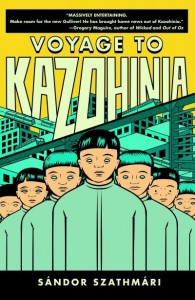Utopia as Transformation
Thursday, February 28th, 2013Utopia is an imaginative endeavor, a conceptual leap that attempts to envision a hypothetical society. Yet the word Utopia also describes a series of real-world projects – from Christianity to Marxism – that bring idealism to bear on the collaborative effort to develop new social structures. It is this intersection of literature and politics that gives Utopian fiction its power. Existing on the frontiers of society – beyond the known borders of the world in early modern times and in the future in more contemporary fiction – Utopian literature has the potential to become reality.
I am drawn to Utopian fiction because of this transformative element. Utopia encompasses the most common catalysts for change in society: political revolution, developments in science and technology, ecological change, religious movements, and alterations in the fundamental nature of humanity. Utopia also more subtly subsumes more subjective transformations, and literary and cultural movements such as surrealism, existentialism, and postmodernism can challenge the fundamental assumptions underlying perceptual reality. While delving into Utopian fiction this semester, I hope to use this transformative power as a unifying theme that will connect disparate times, places, and cultural movements in a conceptual framework extending from the Bible to our modern networked society.



